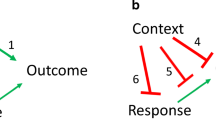Abstract
In the regulation of cortical excitability tonus, Kupalov described a particular acquired, learned mechanism, the shortened conditional Reflex (SCR). SCR is an essential mechanism by which an adequate cortical tonus is established by environmental cues as an anticipatory set-up preparing the individual qualitatively and quantitatively for expected forthcoming events. An original physiological example is given, the conditional “transfer” of motor behavior at cortical electrical stimulation. Three psychopharmacological implications are presented, namely environmental-dependent, stress-related events, environmental-dependent drug conditioning, and drug-tolerance experiments. Future eventual psychophysiological and psychopharmacological lines of research related to the shortened conditional reflex concept are discussed.
Similar content being viewed by others
References
Asratyan, E. A. (1941) The principle of trans-switching in the conditioned reflex activity (in Russian).Fiziological Journal of URSS, 30: 1.
Burunat, E., Castro, R., Diaz-Palarea, M.D., and Rodriguez, M. (1988) Conditioning of the early behavioral response to apomorphine in the rotational model of Parkinson’s disease.European Journal of Pharmacology, 145: 323–327.
Corson, S. A. (1967) Cerebrovisceral theory: A physiological basis for psychosomatic medicine.International Journal of Psychology, 4: 234–241.
Corson, S. A., and O’Leary-Corson, E. (1968) The effects of psychotropic drugs on conditioning of water and electrolyte excretion: Experimental research and clinical implications. InPsychotropic Drugs in Internal Medicine. Excerpta Medica International Congress Series,182: 147–164.
De Graaf, Ch. J., and Korf, J. (1986) Conditional tolerance to haloperidol—Induced catalepsy is not caused by striatal dopamine receptor supersensitivity.Psychopharmacology, 90: 54–57.
Denisov, P. K., and Kupalov, P. S. (1933) The magnitude of conditioned reflexes in bright and obscure rooms (in Russian).Archives Biological Nauk, 35: 689.
Doty, R. W., and Giurgea, C. (1961) Conditioned reflexes established by coupling electrical excitation of two cortical areas. In J. F. Delafresnay (Ed.),Brain Mechanisms and Learning. Oxford, Blackwell Scientific Publications, pp. 133–151.
Eikelboom, R., and Stewart, J. (1979) Conditioned temperature effects using morphine as the unconditioned stimulus.Psychopharmacology, 61: 31–38.
Giurgea, C., and Raiciulescu, N. (1959) Etude électroencéphalographique du réflexe conditionné à l’excitation électrique corticale directe (EEG study of the conditioned reflex by direct cortical electrical stimulation). Presented at the First International Congress of Neurological Sciences, Brussels 1957, VIII EEG. InClinical Neurophysiology and Epilepsy. London, Pergamon Press, pp. 156–176.
Giurgea, C., and Moyersoons, F. (1969) Conditioned interhemispheric transfer by cerebral tetanization.Conditioned Reflex, 4: 243–256.
Giurgea, C. (1970) Central excitability tonus and its modulatory influence upon a neuroleptic activity. In: D.P. Bobon, P. Janssen, and J. Bobon (Eds.),Modern Problems of Pharmacopsychiatry, vol. 5, The Neuroleptics. Basel, Karger, pp. 91–94.
Giurgea, C. (1974) The creative world of P. S. Kupalov.Pavlovian Journal of Biological Science, 9: 192–207.
Giurgea, C. (1987) Gantt and Kupalov: Autokinesis versus shortened conditioned reflexes. In F. J. McGuigan, and T. A. Ban (Eds.),Critical Issues in Psychology, Psychiatry and Physiology. New York, Gordon and Breach, pp. 373–379.
Khananashvili, M. M. (1983)The Pathology of the Higher Nervous Activity (in Russian). Moscow, Edit. Medizina.
Kostenetzkaya, N. A. (1965)Conditioned Reflex Regulation of Cerebral Cortex Tonus (in Russian). Leningrad, Edit. Medizina.
Kupalov, P.S. (1952) On experimental neurosis in animals (in Russian).Journal Vyshei Nervuoi Deiatelnosti, II: 457–473.
Kupalov, P. S. (1961) Some normal and pathological properties of nervous processes in the brain. Pavlovian Conference on Higher Nervous Activity.Annals of New York Academy of Sciences, 92: 1048–1053.
Melchior, Chr. L. (1988) Environment-dependent tolerance to ethanol produced by intracerebroventricular injections in mice.Psychopharmacology, 96: 258–261.
Poulos, C. X., and Hinson, R. (1982) Pavlovian conditional tolerance to haloperidol catelepsy: Evidence of dynamic adaptation in the dopaminergic system.Science, 218: 491–492.
Silverman, P. B., and Ho, B. T. (1981) Persistent behavioral effect of apomorphine in 6-hydroxydopamine-lesioned rats.Nature, 294: 475.
Ungerstedt, U. (1976) 6-Hydroxydopamine induced degeneration of the nigrostriatal dopamine pathway: The turning syndrome.Pharmacological Therapeutics (B), 2: 37.
Vartanian, G. A., and Pirogov, A. A. (1988)Mechanisms of memory in the central nervous system (in Russian). Leningrad, Edit. Nauka.
Yakovleva, V. V. (1951) Experimental neurosis in dogs, under conditions of free behaviour (in Russian).Journal Vyshei Nervuoi Deiatelnosti, 1: 6–11.
Zuckermann, E., and Buffy, A. (1960) Protein-bounded acetycholine output in cortical efferent blood after conditioned reflexes.Experimental Neurology, 2: 423–428.
Author information
Authors and Affiliations
Rights and permissions
About this article
Cite this article
Giurgea, C.E. Kupalov’s concept of shortened conditional reflexes: Psychophysiological and psychopharmacological implications. Pav. J. Biol. Sci. 24, 81–89 (1989). https://doi.org/10.1007/BF02701922
Issue Date:
DOI: https://doi.org/10.1007/BF02701922




